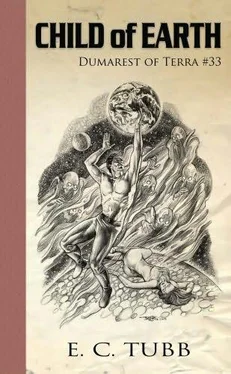E. Tubb - Child of Earth
Здесь есть возможность читать онлайн «E. Tubb - Child of Earth» весь текст электронной книги совершенно бесплатно (целиком полную версию без сокращений). В некоторых случаях можно слушать аудио, скачать через торрент в формате fb2 и присутствует краткое содержание. Жанр: Фантастика и фэнтези, на английском языке. Описание произведения, (предисловие) а так же отзывы посетителей доступны на портале библиотеки ЛибКат.
- Название:Child of Earth
- Автор:
- Жанр:
- Год:неизвестен
- ISBN:нет данных
- Рейтинг книги:4 / 5. Голосов: 1
-
Избранное:Добавить в избранное
- Отзывы:
-
Ваша оценка:
- 80
- 1
- 2
- 3
- 4
- 5
Child of Earth: краткое содержание, описание и аннотация
Предлагаем к чтению аннотацию, описание, краткое содержание или предисловие (зависит от того, что написал сам автор книги «Child of Earth»). Если вы не нашли необходимую информацию о книге — напишите в комментариях, мы постараемся отыскать её.
Child of Earth — читать онлайн бесплатно полную книгу (весь текст) целиком
Ниже представлен текст книги, разбитый по страницам. Система сохранения места последней прочитанной страницы, позволяет с удобством читать онлайн бесплатно книгу «Child of Earth», без необходимости каждый раз заново искать на чём Вы остановились. Поставьте закладку, и сможете в любой момент перейти на страницу, на которой закончили чтение.
Интервал:
Закладка:
He said nothing, just sat, watching as Dumarest looked at the chair facing him, face expressionless, eyes intent-a cat studying a mouse, the analogy was plain. In return Dumarest followed the other’s example, remaining silent, noting small things with obvious interest, the way Shandaha was poised on his chair, the tension of his hands, the set of his shoulders. Studying the man as if he were a potential opponent soon to be faced in the arena of blood. A thing he had done before and it had the desired effect.
“We have much to discuss, Earl,” said Shandaha breaking the silence. “But first the preliminaries. Are you at ease? No physical distress? No harm resulting from your unfortunate adventure?” He paused, waiting, frowning as Dumarest remained silent. Then, regaining his composure, reached for one of the flagons, which graced the table along with glasses and trays of tasty morsels. “Then let us share wine.”
Dumarest watched as the lambent fluid filled goblets of glimmering crystal, deep ruby encased in containers of apparent ice embossed with motifs of gold. The contrast one of design rather that accident. Something which matched the lavish furnishings of the chamber.
“Help yourself, Earl.” Shandaha lifted his own glass as Dumarest obeyed. “A toast, my friend. To life and happiness.”
He drank and Dumarest followed, sipping the wine, conscious of the rich sweetness, the subtle strength.
Lowering the glass he said, “How is Chagal? I had hoped to see him. Nada said she had found him in distress.”
“Her concern was for you, Earl, not the doctor. I appreciate your interest but you have no cause to blame yourself for what happened. To him, that is. The wall is another matter. Why did you break it?”
“I wanted to find out what was on the other side.”
“Did you?”
“I found darkness and little else. A room of some kind, I think. I don’t even know how long I was there.”
“Not long. You were fortunate. Nada was quick to give the alarm and you were rescued almost immediately. You had broken into a chamber holding machines of power and the residual energies could have severely damaged your cortex.” Shandaha added: “But you have yet to answer my question. To simply smash a hole in a wall to satisfy a whim seems the height of stupidity. You could have died, or been crippled, burned, disfigured.”
“Or freed.”
“What?”
“When you are in a place you cannot leave that place is a prison,” said Dumarest. “I am here. I am unable to leave so, to me, it is a prison.”
“Nonsense!” Shandaha was impatient. “You are free to leave whenever you choose.”
“To go where? To do what? And how to do either without transportation? Provisions? Clothing?”
“An interesting challenge, Earl. I am sure you have already solved it.”
“I called this place a prison,” said Dumarest. “Let me use another term which might clarify the situation. For you, of course, I am clear on the matter. Think of a maze. A pattern of lines or constructions-bricks, bushes, hedges, bales of hay, lines of chalk-anything. The pattern is the important thing. It can be simple or complex. A path which loops and turns and wends in endless configurations only one of which is clear. One which has to be chosen at each junction, each fork, each barrier.”
“I know what a maze is, Earl. Your point?”
“A maze is a prison. There are prisons which are mazes, deliberately so. Buildings which are honeycombed with oddly shaped chambers, tubes, vents-anything a sadistic mind can imagine. Three-dimensional hells of calculated torment. People die in there.”
“So?”
“There is one weakness in a maze. Not those built as prisons though the same principles apply. Now I’m talking about the ceremonial type of maze. The paper-puzzle kind. A long time ago I was held in an establishment for a while. The warden was fond of mazes and had what he thought was a good idea. He issued them to us to work at. All were different but basically the same. You entered the maze and worked to find a way out. Tracing the correct path earned a small privilege. Some managed to do it fairly. The rest cheated.”
“You among them, Earl?” Shandaha had relaxed, drinking, now refilling the goblets with wine. “How did you cheat?”
“As I demonstrated a short while ago. I tried creating a short-cut. On paper I would have crossed a line. In a large maze I would have jumped over the barrier or broken through the hedge or whatever had been used. Here I smashed down a wall.”
“And what did you gain?”
“I was hoping you could tell me.”
“I thought I had. You broke into a small chamber housing electronic devices. You admit that you slipped and struck your head with force enough to render you unconscious. You were rescued, attended, put into Nada’s care.”
Who had reported everything she had been told to her master. Dumarest was not surprised. He had anticipated her action and his talk about prisons and mazes had been simply to divert Shandaha’s interest away from what had really taken place.
He said, “I apologise. I had forgotten. That blow I suffered was more severe than I thought. I must apologise, also for having broken that wall. If you will allow me the use of materials and equipment I am willing to repair it.”
“No, Earl. You are gracious but there is no need for me to accept your offer.”
“It will be of no trouble and I could use the exercise.”
“No.” Shandaha was firm. “The subject tires me. We will talk no more about it. More wine?”
He lifted a flagon and poured as Dumarest nodded his acceptance. He watched as it flowed into the glasses wondering what had been added or was being added to the rich liquid. Nothing, he guessed. It was a simple matter to spike a drink with the use of a pill held between two fingers or a drop of liquid held in the hollow of a palm, but the way Shandaha poured precluded either possibility. He touched only the flagon. In any case he would have no need to be so crude.
Dumarest leaned back in his chair and apparently relaxed, sipped at his wine as he studied the table, the furnishing, Shandaha himself. All seemed no different than they had before, yet he was convinced that nothing was what it seemed to be. Shandaha had lied about what was beyond the crystal wall. There had been no chamber, no exotic electronic devices emitting flares of energy, but he had no intention of admitting anything else.
“This is excellent wine.” Dumarest set his emptied glass back on the table. Do you manufacture it?”
“Why do you ask?”
“I am curious. It would be a pleasure to examine your equipment. I once owned a small vineyard but I could never produce a vintage such as that I have just enjoyed. Also, with respect, I have never possessed a domain such as yours. On both counts I envy you.”
“Do you mock me?”
“Mock?” Dumarest shook his head. “That I would never do. I am your guest and am sincere in what I say, but if the subject displeased you then another can be chosen.” He paused, waiting, then as the other remained silent said, “Or, perhaps, you would care to answer a question?”
“Continue.”
“Why did you summon me?”
Shandaha made no reply and Dumarest felt a warning prickle of danger. To tease the cat wasn’t a good idea if you were a mouse. He had triggered a flash of anger and had tried to rectify the error, but diplomacy wasn’t always easy and he was in no position to make a powerful enemy.
He said, “Nada told me that you had sent her to tell me you required my presence. She didn’t arrive in time, but when she came she was instrumental in saving my life. She would not have been able to do that had you not sent her. So, logically, you are the one I must thank for my continued existence.”
Читать дальшеИнтервал:
Закладка:
Похожие книги на «Child of Earth»
Представляем Вашему вниманию похожие книги на «Child of Earth» списком для выбора. Мы отобрали схожую по названию и смыслу литературу в надежде предоставить читателям больше вариантов отыскать новые, интересные, ещё непрочитанные произведения.
Обсуждение, отзывы о книге «Child of Earth» и просто собственные мнения читателей. Оставьте ваши комментарии, напишите, что Вы думаете о произведении, его смысле или главных героях. Укажите что конкретно понравилось, а что нет, и почему Вы так считаете.












